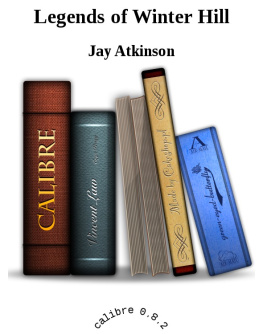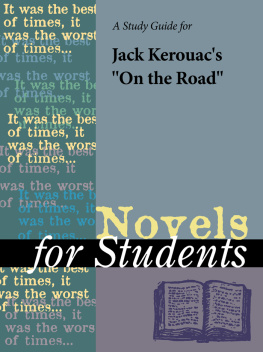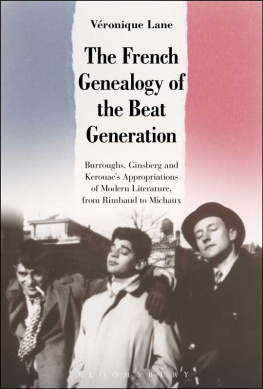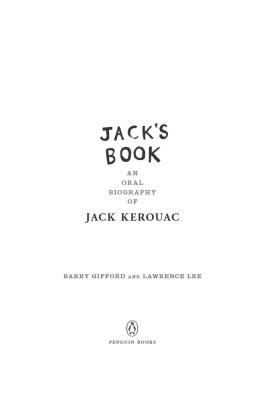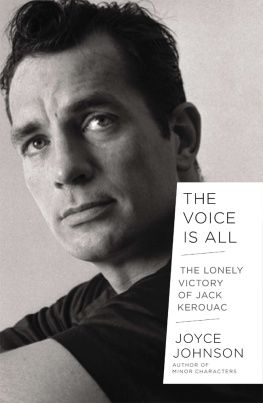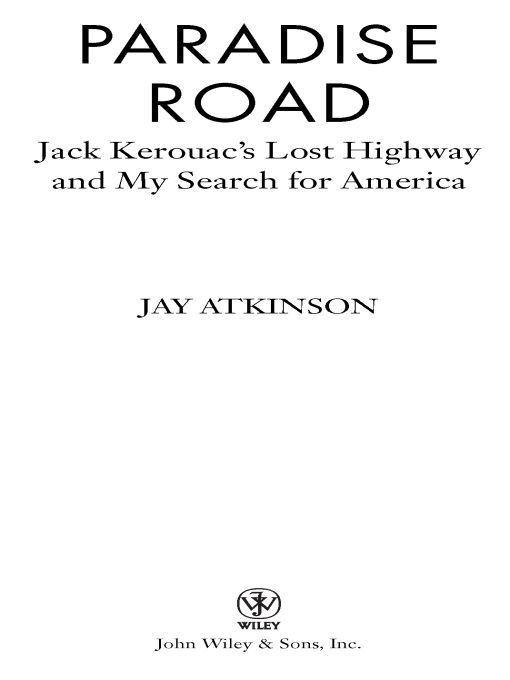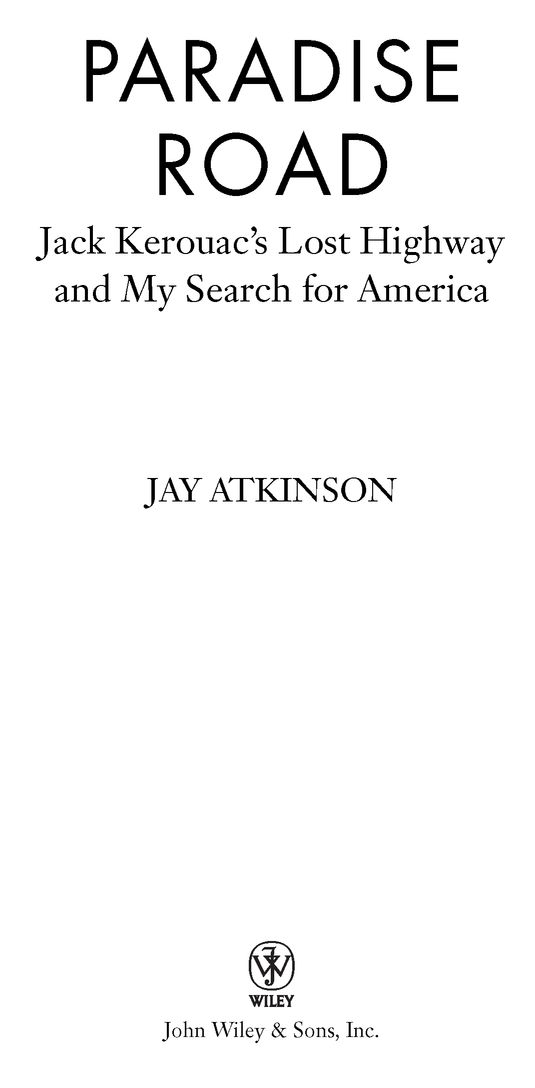Table of Contents
For Surfer, Bongo, and Piercey
When youve understood this scripture, throw it away. If you cant understand this scripture, throw it away. I insist on your freedom.
Jack Kerouac, The Scripture of the Golden Eternity
PREFACE
The Big, Rushing Tremendousness
In the spring of 1947, a young unknown writer rode the 7th Avenue subway to the end of the line at 242nd Street and then took a trolley to Yonkers, New York, stuck out his thumb, and began hitchhiking. His trip, and the novel that grew out of it, would change the course of American literature. For that athletic, dark-haired young man rushing off the platform at Yonkers was Jack Kerouac, and his wanderings over the next three years, from New York to Chicago to Denver and back again, in freight trains, travel bureau cars, and buses; San Francisco to Fresno; North Carolina to New Orleans; through Colorado, across the arid plains of Texas, and down to Mexico City, would be immortalized in his 1957 masterpiece, On the Road.
By traditional standards, the Kerouac of those early years was a failure. A Columbia University dropout and washed-up football star, discharged from World War II military service for having an indifferent character, the Lowell, Massachusetts, native was, at age twenty-five, living with his widowed mother, Gabrielle, in a tiny apartment in Ozone Park, New York. But Kerouac, nicknamed Memory Babe by his old school chums for his prodigious recall, was determined to become a published writer, sleeping all day, waking after dark to take long walks through Brooklyn and Queens, and churning out what he hoped would be the Great American Novel. His first book, which grew into more than a thousand pages of raw manuscript and owed a great debt to Thomas Wolfe, would be published in 1950 as The Town and the City. It could be said, however, that Kerouacs tale of a war-torn New England family was in black and white, and soon he would be writing in color.
Later on, he would name his new method spontaneous prose, an intoxicating mix of sharp, clear observations and descriptions, made-up words, popular and obscure references, poetic insights, and spiritual longing, all strung together with long dashes, ampersands, and ellipses. Of his stylistic breakthrough, Kerouac wrote in his journal, Here, I think, is one of the secrets that will lead to the miraculous novel of the future, and when Im finished with T & C in all its aspects, Im going to discover a way of preserving the big rushing tremendousness in me and in all poets. At age thirty-five, ten years after he set out from Yonkers with his old sea bag, Jack Kerouac would become famous (he called it fame mouse)a condition he was particularly unsuited forand his miraculous novel,On the Road, would be recognized as the hallmark of his contribution to American letters.
Of course, Kerouac didnt know any of this back then. Fascinated by letters written by a young, Denver-based car thief named Neal Cassadycalled Dean Moriarty in On the RoadKerouac longed to see the West. The fog of war had lifted, and like many other young Americans, at least those who had rejected the suburbs, a steady job, and a two-car garage, Kerouac was seeking girls, visions, everything. Many of the future Beats appear in On the RoadAllen Ginsberg, Herbert Huncke, William Burroughsbut none so dramatically and explosively as Cassady, the Adonis of Denver, Kerouacs chauffeur, comic foil, and amorous rival, popping up at irregular intervals to shock the young writerhere called Sal Paradisefrom his solitary pursuits.
It s believed that Kerouac first used the written word beat as an adjective in his 1948 journal, referring to Huncke. But he never embraced the definition of beat or the Beat Generation, such as it was, as defeated or beaten, preferring the Catholic notion of beatific vision, or the immediate knowledge of God that the angels enjoy in heaven. Its also important to note that the Beat writers and wannabes were no more a literary or social movement than a group of anarchists could be called a political party. In fact, as early as 1958 the literary critic John Sisk called the Beats an ephemeral oddity, claiming that they and their unruly works would soon fade from the public memory. Obviously, that has not been the case. In recent years, Kerouacs image has been used to sell name-brand khakis and running shoes, and his book sales have risen steadily. Still, in the minds of many hoary-handed academics, Kerouac and his iconoclastic friends, particularly Cassady, remain the louts of American Lit.
A legendary con artist and ladies man, Cassady, so they say, had literally been born on the road, in a moving car outside of Salt Lake City, and grew up in the sporadic company of his father, Neal Sr., a onetime tinsmith turned wino and bum. They spent most of their time in Denver, with young Neal hustling pool on Larimer Street and appearing in court on behalf of his neer-do-well dad when Neal Sr. was picked up for vagrancy and other two-bit crimes. Left mostly to his own devices, Neal was sent to reform school at age sixteen for stealing a car, then drifted in and out of various institutions over the next few years. By the age of twenty-one, when he made the acquaintance of Kerouac, Cassady was an impressive figure: lean, bony-faced, and muscular, with wavy brown hair and blue eyes. Possessed of native-born intelligence and a keen sense of other peoples vulnerability, Cassady expended most of his energy in pursuit of kicks, most notably girls, jazz music, and lengthy, Benzedrine-fueled conversations aimed at teasing out the meaning of life.
In Cassady, the so-called Holy Goof, Kerouac found a charismatic replacement for his brother, Gerard, who died when he was only nine years old and Jack was four. Shy by nature and uncomfortable speaking Englishthe Kerouacs spoke mostly French at homeJack was emboldened by the power and presence of Neal Cassady, somehow licensed to engage in wild flights of his own. Certainly, there would be no On the Road without this gasoline-fueled muse, driving them across country like the Angel of Terror himself and exhorting Sal/Jack to eschew geometry and geometrical systems of thinking, whatever that meant.
Kerouac made most of his cross-country jaunts on a shoestring. His mother gave him some money, and occasionally hed buy a train or bus ticket with his GI education bill checks. He picked cotton for a spell in Selma, California, and he and his old friend from prep school Henry Cru, called Remi Boncoeur in the novel, had a short but hilarious stint as armed security guards in Marin City, California. Believing that apple pie and ice cream were highly nutritious, Kerouac often subsisted on this confection when he was traveling and took occasional respites in small town parks, doing headstands to relieve his phlebitis, a painful and debilitating circulatory disease. He met a legion of interesting folks on the road, farmers and hill-billies and salesmen, ordinary Americans possessed of quirks and tics that never escaped Kerouacs eye or his ear. Montana Slim and Mississippi Gene and Denver D. Doll and Big Ed Dunkel have therefore taken their rightful place in the pantheon of unforgettable literary characters. Sal Paradise himself is one of the most unlikely heroes in all of literature, and his eccentric and existential journey forms an American Odyssey of the twentieth century.


